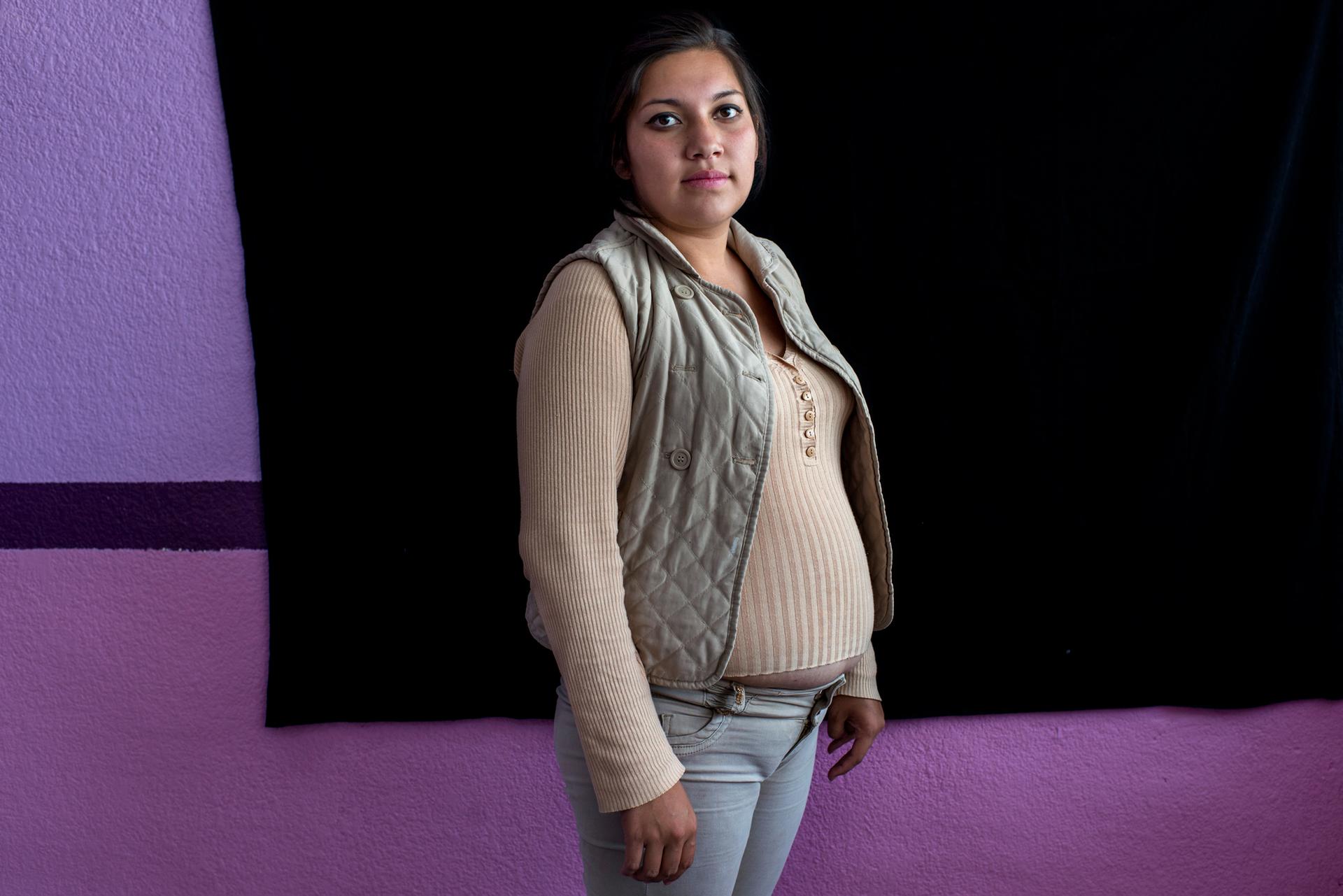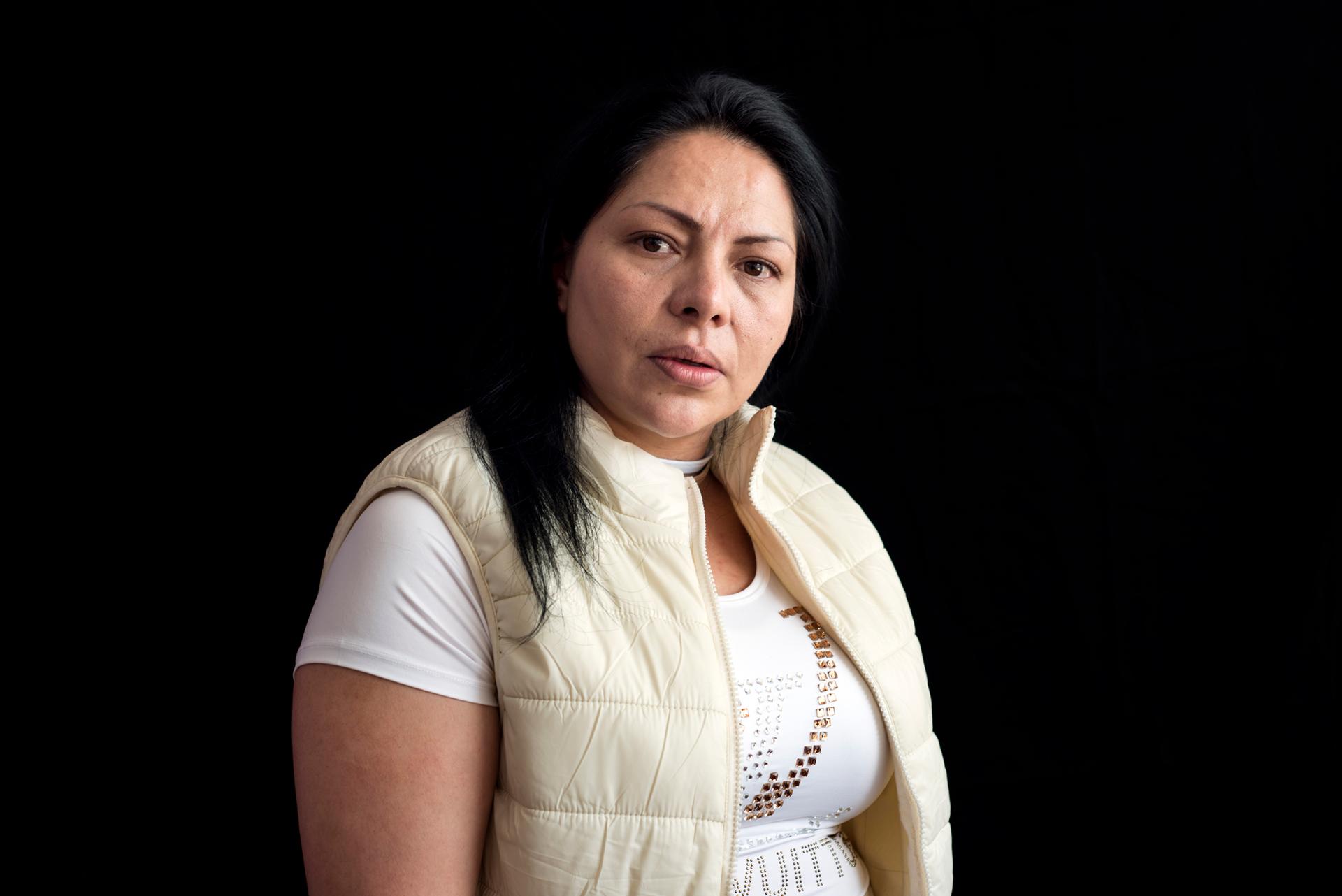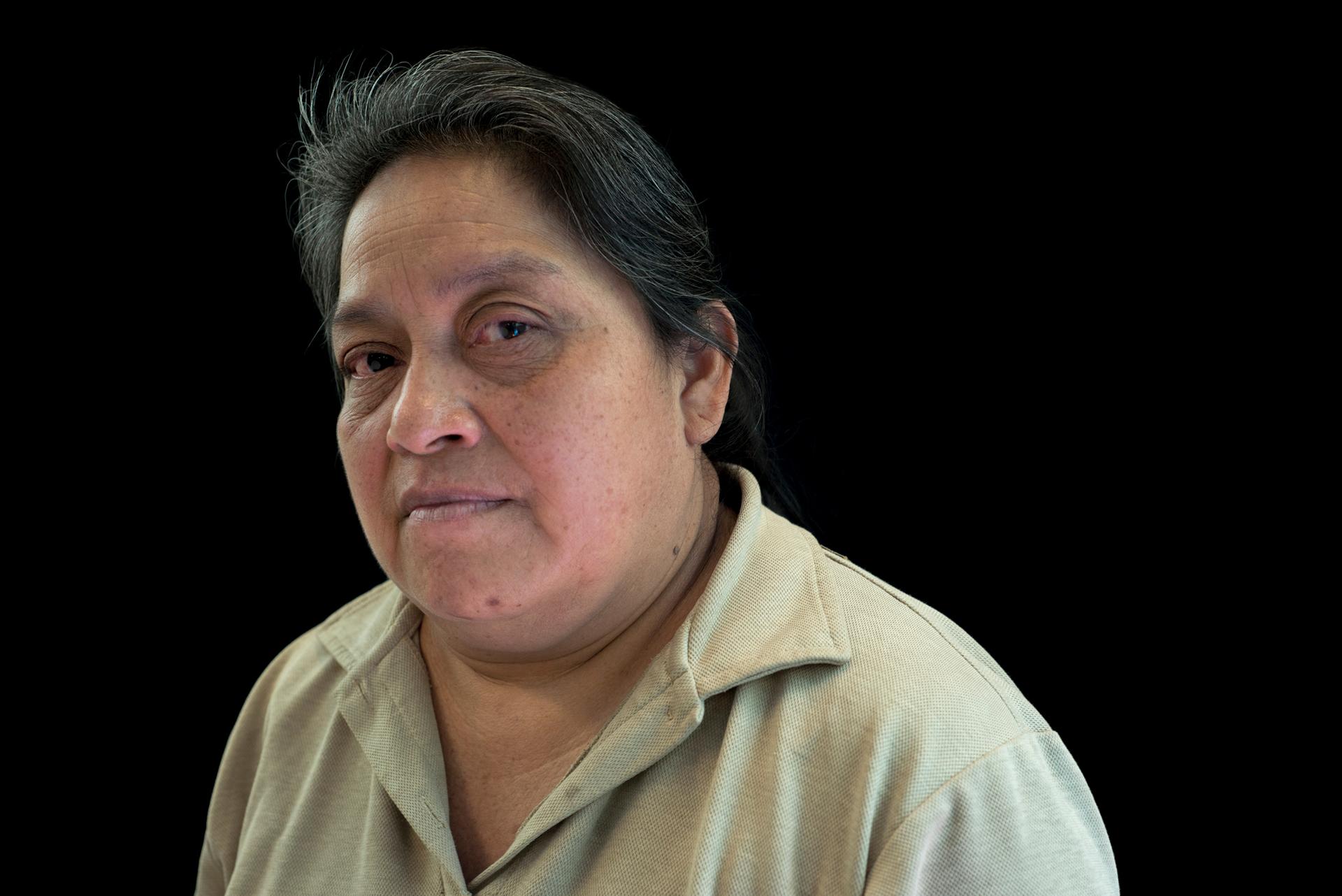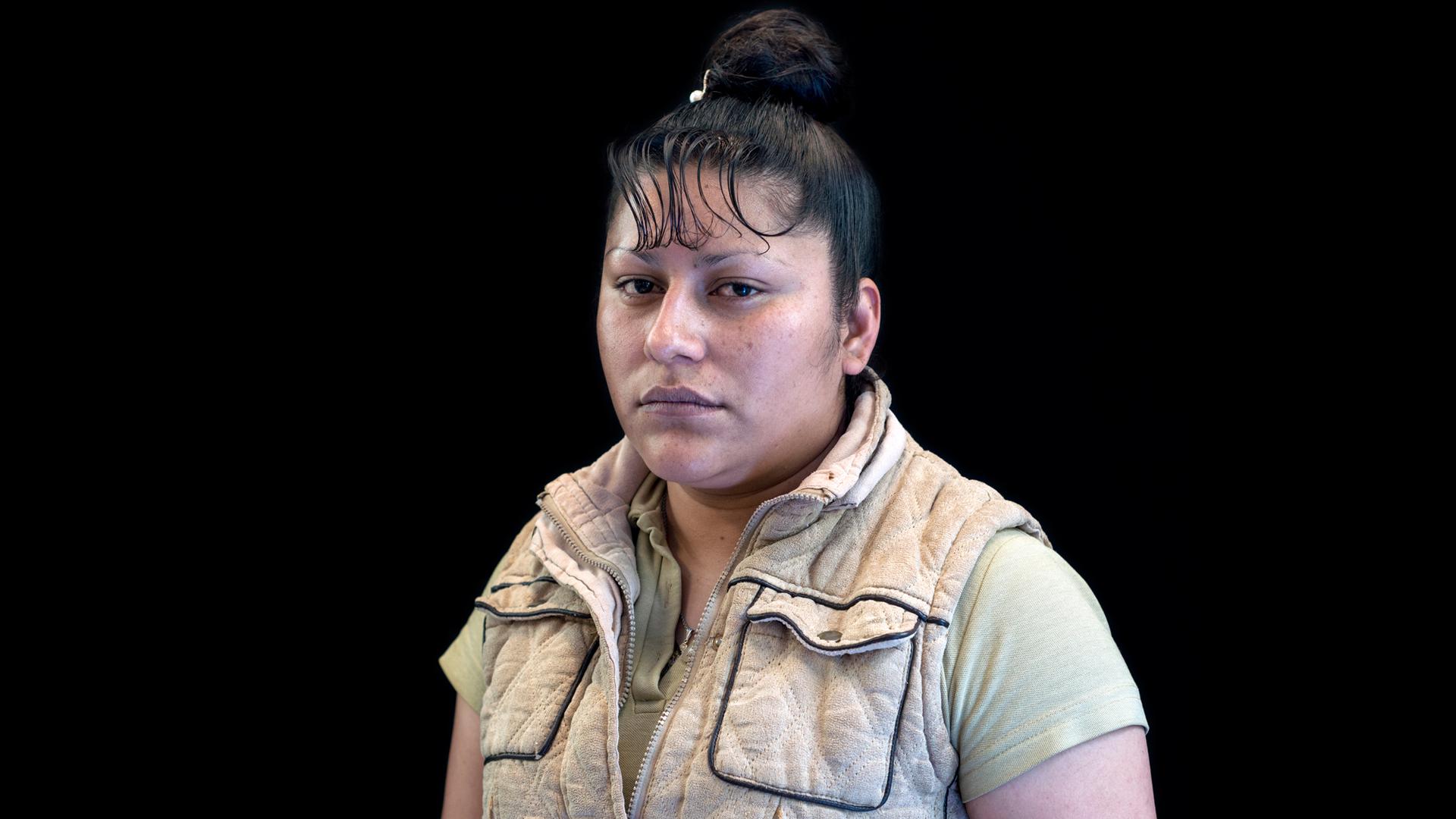Carmela Rodríguez Reyes, 32, is serving a sentence of two years and eight months for distributing crack cocaine.
“What did you come to buy? Love or fear?”
That’s what Carmela Rodríguez Reyes used to ask people who approached her on the street she worked on. When asked what she means by “love,” she answers: a friend with whom to hang out, chat, grab a bite. But most people came for the “fear,” miedo, she says. That’s slang for crack cocaine — that’s what she was selling. It’s called that because you constantly feel “afraid of running out. Afraid of not knowing how to keep ‘scoring.’ Yeah. That’s the fear.”
The fear had a hold on her, too. Today, the 32-year-old single mom is serving time — two years and eight months in Women's Prison Tepozanes — not far from the Mexico City streets she knows so well. Rodríguez talks from a small room by the children’s playroom in the maximum security prison. Like the rest of the place, it’s made of concrete and dimly lit.
Rodríguez vividly remembers the day of her arrest. She was selling crack at her usual post. “It was a sunny day. That day, I wanted to stop getting high.” The authorities came looking for her boyfriend. She says he directed them to her. “He told them it was me, that I was selling. Yeah, he threw me under the bus.” Rodríguez says the officers beat her and detained her. Her now ex-boyfriend, she says, wasn’t arrested that day. Rodriguez doesn't know if he's since been arrested or is still dealing drugs. PRI was unable to find or verify any arrest records for her boyfriend.
In Mexico, where a deadly, two decadeslong war on drugs is underway, the rate of women being locked up for drug-related crimes is on the rise: A recent study by the feminist organization, Equis, which works with the UN in Mexico, found a 103.3 percent increase in women in prison just between 2014 and 2016. This reflects a larger trend throughout Latin America: The number of women in prison climbed 51.6 percent between 2000 and 2015 — compared with 20 percent for men. In Brazil, it went up by 146 percent between 2005 and 2012 for women and 70 percent for men, according to UN statistics. The Organization of American States says "the driving forces behind these exorbitant rates of incarceration are the adoption of extremely punitive drug laws and the imposition of disproportionate penalties."
It’s the result of a perfect storm, according to researchers focused on the issue. There is a growing domestic market for illegal drugs: While the popular adage used to be that Mexico simply produced what America demanded, addiction is largely on the rise here. And in a country where nearly half the population remains under the poverty line, many still see this business as a worthwhile risk.
It doesn't get a lot of media attention, but women are attractive as foot soldiers for drug sales — single mothers, in particular. "Drug traffickers like reliable people," explains professor Raul Benítez Manaut, from the National Autonomous University of Mexico, who studies drug trafficking and policy. He says the elderly are also sought after because they are less likely to be harassed by police or sent to jail. Small cartels look to hire people who won't arouse suspicion and won't go wild consuming the product, he says. But the foot soldiers are also among the first to be targeted in crackdowns.

In his election campaign a few years ago, Mexican President Enrique Peña Nieto promised to end violence against civilians. But by all accounts, his administration has given carte blanche to the armed forces. Last year was the country’s most violent on record, with over 25,000 people murdered, many of those killings drug-related. Nongovernmental organizations such as Human Rights Watch and Amnesty International have stated that they are deeply concerned about the use of torture and beatings to extract confessions — including sexual torture against women.
Human rights groups have also raised the alarm over arbitrary and unusually long arrests without sentencing. ASILEGAL, an NGO that provides legal support for vulnerable populations in Mexico (they consult for the UN), has denounced the number of inmates in "protective custody" awaiting sentencing — which it found to be as high as 40 percent.

‘Everything around us was just drugs and getting high’
Rodríguez says she pretty much keeps to herself in here, and she rarely allows her children, a boy and girl, 11 and 9, to visit. She doesn't want them to see her like this. When Rodríguez talks about them, her eyes well up. The kids live with her parents now.
Her unraveling began when her husband left them nearly a decade ago. It wasn’t just an emotional blow; it was financially crippling. Government support for single mothers here is meager. Alimony laws are not well-enforced. She gets riled up just listing the expenses she was shouldering: food, school, electricity, gas, phone bills, her mom’s medication. “I started thinking, ‘What am I going to do now? It’s a lot of money, and I can’t by myself.’”
Rodríguez started breaking under the stress. Drinking a lot. Partying. She met this guy. He was a small-time drug dealer, and her life changed when they got together. “As of that moment, everything around us was just drugs and getting high.”
She remembers one night, she was worried about the kids, and someone offered her a hit of something to smoke. She didn’t care what it was — it felt like “being free. I forgot about everything. At that moment, it was just me. There was no one else. I forgot about my kids, my family, everyone. I forgot about everyone. And I liked that. I liked feeling that peace and tranquility inside me.”
It was crack, and it wasn't long before Rodríguez was hooked. Pretty soon, her boyfriend told her that if she was going to use, she had to sell the stuff, too. He said he’d teach her how to do it.
For Rodríguez, the addiction took over everything. She wouldn't see her family for months at a time. She was skin and bones. She’d stay awake for nights on end, afraid to fall asleep and wake up craving. “That,” she says, “that is fear. Because my body felt tired but I wasn’t sleepy. I wanted to stay awake because I thought, 'If I fall asleep, I won’t smoke, and I can’t. I can’t not smoke.'"
One day, Rodríguez says she was on the street she worked. “I sat on the curb, under the shadow of a tree. And I looked up and down the street, and I thought to myself, ‘What am I doing here? I’m not from here. What am I doing here; why did I choose to be here?’”
Later, when she told her boyfriend that she wanted out, he rebuffed her: "You leave when I say you leave."
Women on the 'lowest rungs of the drug trade'
The vast majority of women going to prison in Latin America are single moms like Rodríguez. Oftentimes, women are forced, either by life circumstances or by an abusive partner, to enter the drug trade. And when a woman gets sent to prison, the impact can be especially devastating, since she's usually the head of the household.
“We’re talking about people who are at the very beginning of the drug-trafficking chain," says Coletta Youngers, a senior fellow at the Washington Office on Latin America’s (WOLA) drug policy reform project. "They are engaging in selling drugs or transporting a small amount of drugs because it’s an easy way to combine their child care responsibilities with an income, and they're looking for a way to put food on the [table] for their kids."
Youngers says higher-stakes players, like Rodríguez’s boyfriend, stay out of prison by giving up information. “These women who are on the lowest rungs of the drug trade, they don’t know who is running the operation. Which means they can’t plea bargain.” The arrests make for great statistics, but Youngers says, “it makes absolutely no dent on the drug trade. Somebody selling drugs on the corner is arrested, and the next day, somebody is going to be at that corner.”
In response, she and other women's advocates say that Mexican courts need to adopt more gender-oriented sentencing policies and practices that take into consideration the challenges for women and indigenous people, who continue to face considerable obstacles in this society.

For example, Equis recommends that courts look closely into drug mules and lower-level cartel employees — and examine whether they were coerced and if they knew what they were transporting. The group also encourages exploring alternatives to prison such as community service, fines or home arrests, especially for women with children. In Mexico, the law forbids protective custody of pregnant women. Equis also underscores the need for better drug treatment programs.
Rodríguez, now a healthy weight, white-knuckled herself sober, without the help of any treatment program, on a steady diet of cigarettes and candy to curb her cravings. It’s an admirable effort, but you have to wonder: When she gets out of here and goes back to the same community where she became addicted, with no medical or psychological support, will her sobriety last?
Youngers says there also needs to be a change in Washington, DC. Over the last decade, the US government has committed more than $2 billion in funding and intelligence resources to Mexico’s counternarcotics effort. President Donald Trump's rhetoric has indicated further support for militarizing the drug war. Youngers says it's misguided. "There has been tremendous pressure from the US government for Latin American governments to tow the line on drug policies designed in Washington — one-size-fits-all, no taking into consideration the realities on the ground.” In other words, it's all well and good to invest in enforcement and intelligence, but that won't solve the cycles of desperation that often lead people into the drug trade, to begin with.
No more fear
But some people are less sympathetic about the growing female population in Mexico prisons.
Many Mexico prisons are filled with women who had a boyfriend, a father or a friend whom they say got them into the drug trade. “If you interview a female inmate, she will tell you she’s innocent; that she shouldn’t be there,” says professor Raul Benítez Manaut, from the National Autonomous University of Mexico. “The majority of them are guilty. They just won’t recognize it. Even though they are in jail,” he continues. “Let’s say, 10 or 15 percent of them are actually innocent. But they are mostly guilty.”
This might not be the most politically correct opinion, but it isn't an unpopular one: A 2017 poll suggests that over half of Mexicans prefer that the military "take over to keep the streets safe," as opposed to the police, and a majority of Mexicans believe without the armed forces' involvement, crime and violence would be even worse. And some may feel that to get back to normal life, people like Rodríguez need to be locked up, regardless of how or why they got involved.
Surprisingly, Rodríguez herself says prison is exactly where she needs to be. “I’m thankful to God for bringing me here.” It forced her to quit drugs, and rethink her life.
Rodríguez has one month left of her sentence. Then she’ll go back out there to her kids. When asked if she’s worried about getting sucked back into the drug trade, she says no — “Now, I only have love to give.” She says this time, she has no fear.
